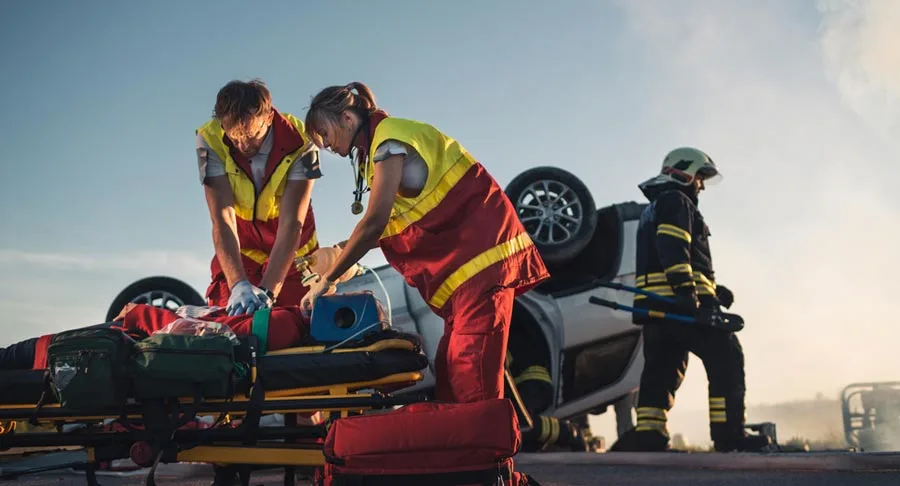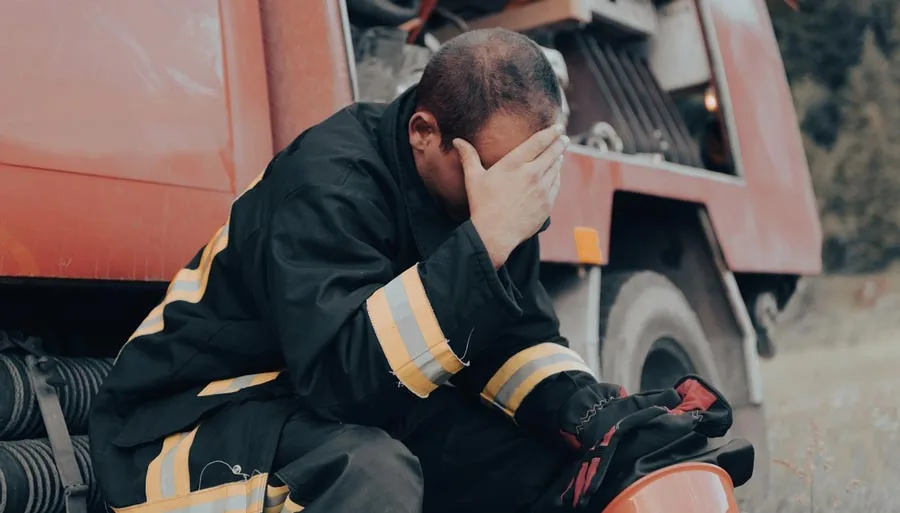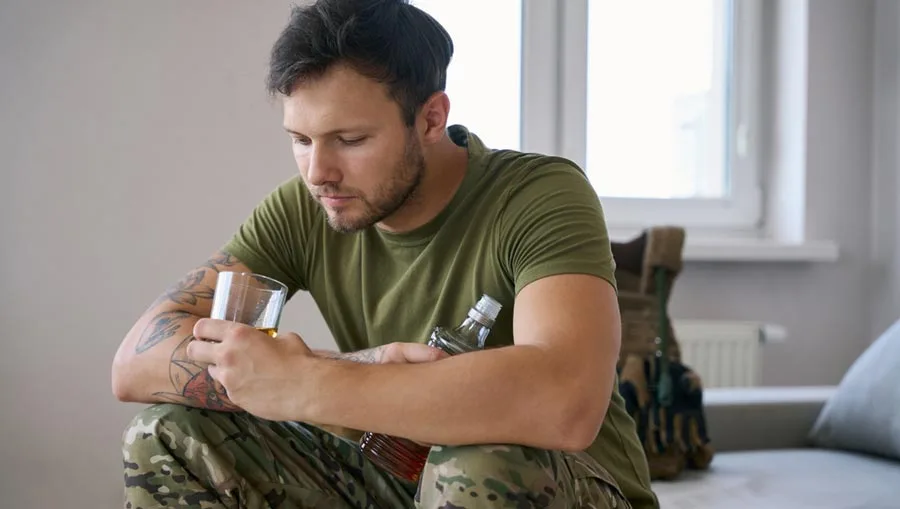Addiction Treatment Programs for First Responders
First responders are usually at the forefront of protecting their communities from dangers like natural disasters. Police officers, firefighters, paramedics, and other people working in public safety departments risk their lives for American citizens.
It would be an understatement to say that these brave individuals’ jobs are challenging. Sadly, the complexity of first responder’s work can be overwhelming at times, and the immense pressure they endure makes them highly vulnerable to developing addiction and mental health services.
Although substance abuse is common among these professionals, South Shores Detox and Recovery can help first responders get their lives back on track. Read on to learn more about our first responder addiction treatment services and find help for yourself or a loved one today!
What is a First Responder?
Most people think of a police car, fire department, or the Federal Emergency Management Agency (FEMA) when they hear the term “first responder.” Although these workers are among the first to arrive at the scene of an emergency, dozens more career fields are considered first responders.
Below are some of the most common examples:
- Air marshals
- Police officers
- Emergency responders
- DEA agents
- ATF agents
- Animal control officers
- Fire department officers
- Wildfire containment crews
- Military service members
- Red Cross members
- Campus security officers
- Park rangers
- Crisis response teams
First responders are usually the first to arrive at the scene of a disaster in varying scenarios, such as crime, terrorist attacks, accidents, and natural disasters.
Their primary responsibility is to use their expertise to stop or lessen the damage that might otherwise be done to humans, animals, and property. Despite this, first responders are more prone to experiencing traumatic events than the general population due to the nature of their work.
Many people, including doctors, therapists, and first responders, used to think that those who chose a job in emergency services were naturally tougher than the general public.
First responders face various challenges predisposing them to PTSD, depression, and other mental health problems. Many first responders use drugs to cope with the intensity of their work.
Trauma Among First Responders
Emergency responders are subject to high-stress levels and are at increased risk for developing post-traumatic stress disorder (PTSD) because of their profession. When they deal with the trauma of the victims of the crime or disaster, many first responders will also suffer from secondary trauma.
Caregiving in times of crisis is physically and emotionally intensive, which can have a cumulative effect on one’s health.
Psychologists understand the mental health of first responders is defined by the stress they’ve experienced on the job or by the danger they’ve seen or felt in their immediate surroundings. The emotional experience and subsequent evaluation of the event are characterized by a sense of helplessness.
In contrast to the average individual who might encounter a few traumatic occurrences in their lifetime, first responders face such situations daily. The cumulative effects of this stress on these workers’ minds and bodies are devastating.
Developing PTSD as a First Responder
Post-traumatic stress disorder is a common mental health issue among people who work in emergency services. While PTSD affects about 7% of American people overall, it involves first responders at a substantially higher rate.
People and first responders with PTSD are more likely to develop metabolic conditions, such as:
- High cholesterol
- High blood pressure
- Intolerance to glucose
Other than an increased risk of developing these and other chronic health problems, first responders with untreated acute and chronic stress difficulties are at a higher risk for:
- Cardiovascular diseases
- Hypertension
- Obesity
- Diabetes
Traumatic stress, such as that experienced by first responders, can lead to PTSD and other mental health issues. For example:
- First responders can suffer line-of-duty traumas (LODT) if they witness the death or near-death of community members, other responders to the crisis, or themselves.
- The stress on other first responders increases when one is killed while trying to save or treat another person. This is known as “line-of-duty death” (LODD).
- What follows a shooting by a police officer, sheriff, or other protective officer and the lasting effects on the officer and their community is known as post-shooting trauma in law enforcement (PSTLE). The stress of the shooting itself is compounded by the pressure of the subsequent investigation, reporting, interrogation, and other events necessary to understand why the shooting occurred.
Mental Health and Substance Abuse Stigma Among First Responders
According to the Substance Abuse and Mental Health Services Administration (SAMHSA), mental health disorders and drug or alcohol abuse are common medical conditions in the United States, affecting many American adults and first responders. However, people may be reluctant to seek treatment for mental health issues due to the associated stigma.
This stigma can be even more significant for first responders because:
- Those who work in emergency services know better than anyone how challenging their jobs can be. Therefore, many consider it an integral part of their mission to appear “tough” and to aid those in trouble.
- Symptoms of a mental health condition, such as anxiety and depression, can be disconcerting for many first responders because they counter the image of toughness they have developed in their careers.
- Many first responders avoid getting help out of shame or embarrassment that they will be seen as less competent or trustworthy than people who do not struggle with mental health issues.
Even Protectors Need Help: Breaking the Stigma of Addiction
The medical community is trying to lessen the social stigma surrounding mental illness and drug or alcohol addiction.
Mental and physical illness are not indicators of fortitude or weakness. They are chronic conditions that develop progressively. The brain can suffer damage from both acute and chronic stress. Seeking medical attention can help lessen the adverse effects.
First responders are usually reluctant to seek care due to mental illness and addiction stigma. Many first responders’ symptoms will increase if they don’t get respect, which can adversely affect their quality of life and productivity on the job.
Some people suffering from mental health disorders may try to self-medicate with substances like alcohol or drugs, making matters worse.
First Responders Addiction Treatment Programs
Addiction treatment for first responders entails specialized treatment methods. Addiction treatment that is successful for someone outside of the first responder community is not always appropriate for those working in the field. This is because many people working in emergency services have experienced trauma.
People working in addiction treatment must collaborate with first responders, keeping their specific perspectives in mind.
Addiction treatment for first responders is handled with the utmost compassion and understanding at South Shores. Our team recognizes the difficulty of surviving traumatic experiences and the lasting effects they can have on survivors.
Below are the most common addiction treatment programs for first responders:
Detoxification
Detoxification is the method used to rid the body of medications. Detox is usually the first step before attending therapy for first responders.
Medical staff and treatment experts will closely monitor first responders while withdrawing from drugs and alcohol. Since withdrawal can be harmful or even fatal if not managed by medical professionals, this provides a secure environment for recovery.
Inpatient Treatment or Residential Care
Inpatient care involves living at the rehab center during treatment. Depending on your needs and how well you respond to treatment, this may be the first level of care you attend or the only level of care you ever receive. Many clients who have completed inpatient therapy prefer to continue their recovery through one of our various outpatient programs.
Our inpatient treatment programs include group therapy and individual therapy sessions for first responders. We also offer family therapy sessions for family members. These meetings aim to help first responders recognize the emotional triggers that lead them to use substances. Different types of therapeutic methods are available here at South Shores.
Outpatient Addiction Treatment Program
People receiving outpatient care often leave the facility at the end of the day. The time you spend in recovery during the day will vary based on the nature of your addiction and any co-occurring mental health disorders.
Those in our outpatient programs, which are first responders, typically attend morning group therapy sessions before reporting to work after completing detox. Clients in our outpatient rehabilitation first responders program must put in at least nine weekly treatment hours.
Intensive Outpatient Programs (IOP)
There is very little difference between intensive outpatient and standard outpatient care. Attendance requirements vary only in terms of length of time. Spending more time in therapy sessions is expected in an IOP compared to a standard outpatient program.
Those enrolled in intensive outpatient treatment for substance abuse and mental health issues do not live at the treatment center during their stay. You can maintain your current employment commitments while participating in an IOP.
Partial Hospitalization Programs (PHP)
The next step up from intensive outpatient programs is partial hospitalization programs. These responders programs entail a minimum daily commitment of about 5 hours, most of which must be spent in therapy sessions.
Clients in PHP typically need to visit the rehabilitation center anywhere from five to seven days each week. After attending your daily treatment sessions with the help of experts in the field of addiction, you can go home.
Get Effective First Responders Addiction Treatment at South Shores
At South Shores Detox and Recovery, we know the various causes of addiction among first responders. Addiction and mental health diseases can severely affect a person’s work and relationships with loved ones.
When members of the first responder community can beat their addictions, it positively affects the communities they serve.
Please get in touch with us if you are a first responder who is struggling with substance abuse.
Contact us for more information about drug and alcohol addiction treatment and our first responders’ program today. All calls are completely confidential, so reach out in confidence today to get options!





